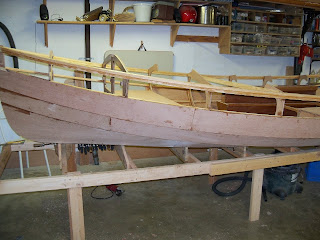Nevertheless, Im glad to say that I am making some progress.
Ive got most of the third row of planking on.

Ive fitted the anchor well floor, the front seat, and started fitting the rear side seats. Its a good idea to cut these to size before installing the third row of planking. Its much easier to fit them in place over sized and scribe the outer hull position using a batten then to try and fit them later.



I have learned two valuable lessons this time around:
Lesson #1. Carefully inspect your plywood, no matter how good its supposed to be. After installing part of my starboard plank, I noticed that something looked odd at one of the edges. Closer inspection revealed this:

Yikes! About a half inch of the edge of this sheet of plywood didnt get bonded properly. Im using Aquatek BS-6566 marine plywood and Ive built two boats using this stuff, and this is the first time Ive run across a flaw like this. I had to trim a half inch from the forward edge of one of my planks, which was already installed, to get rid of the bad edge. Im inspecting every piece from now on.
Lesson#2: When installing the planks, its easy to clamp them along the top edge, but the bottom edge has to be fastened with screws, which are removed after the epoxy cures. This leaves a line of ugly screw holes that has to be plugged and sanded. I started doing it this way but then I found a better way. Now I use my PowerShot staple & nail gun loaded with 1/2" nails.

This stapler has just enough power to drive these tiny little nails most of the way through a 1/4" sheet of plywood and into the underlying stringer. To install the plank, I goop the stringers up with "peanut butter", clamp the plank in place along the top, then press firmly along the bottom and drive in a nail every few inches or so.

The little nails are easily pulled later on with a pair of pliers, leaving just a little pinhole. The only downside is that the stapler has a tendency to jam but it still beats using screws by a long shot IMHO.
0 komentar:
Posting Komentar